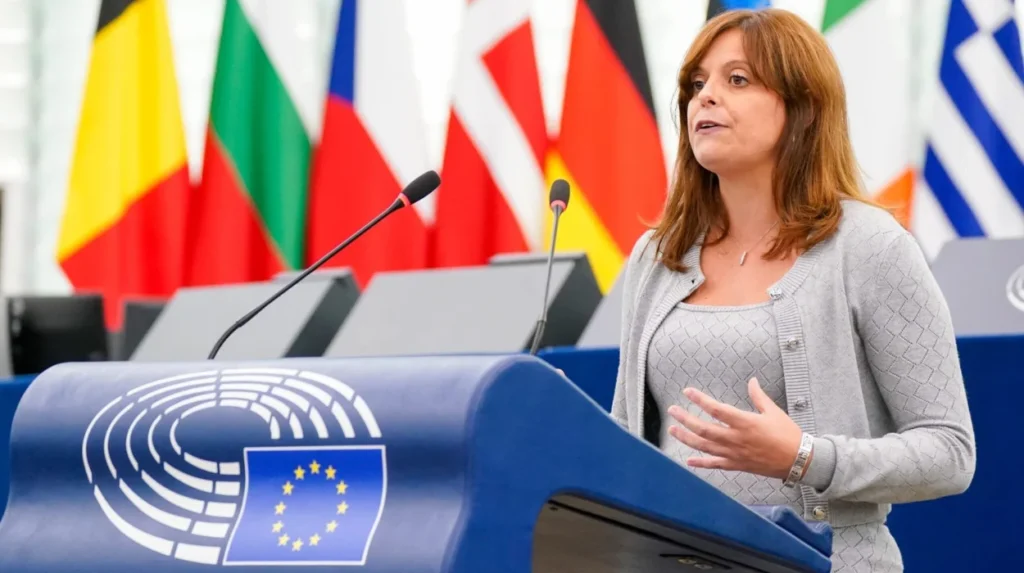The European People’s Party (EPP) group has publicly declared it will not support efforts to grant parliamentary immunity to the MEP popularly known as the ‘Hammer Girl.’ This decision marks a significant stance amid ongoing controversy surrounding the MEP’s conduct and the investigation into her actions. The announcement comes as part of a broader debate within the European Parliament about balancing legal accountability and political protection for members.
The controversy centers on an MEP who gained notoriety after being filmed wielding a hammer during a dramatic protest in the parliamentary chamber. Known in media circles as the ‘Hammer Girl,’ she has drawn both criticism and support for her highly symbolic yet disruptive act. Legal proceedings have since begun, and discussions about whether she should be afforded immunity from prosecution have intensified among her political peers.
The EPP’s refusal to back the immunity motion signals a clear division within the European Parliament’s main political groups. As one of the largest political factions, EPP’s position holds considerable weight in determining the fate of the motion and the broader political implications that will unfold.
Political Ramifications and Inside EPP Debates
The EPP leadership has weighed the risks of supporting an immunity request that could be perceived as endorsing violent or disruptive behavior.
“We must ensure that elected representatives uphold the highest standards of conduct,”
stated an EPP spokesperson, emphasizing the party’s commitment to protecting democratic institutions from acts undermining parliamentary decorum.
This stance follows internal deliberations where concerns about member accountability clashed with fears about potential political backlash. Some within the group argued that immunity is a traditional safeguard for MEPs under threat for their political opinions or actions performed in office. However, the majority aligned with the position that the conduct in question falls outside legitimate parliamentary activity.
The decision not to vote in favor of immunity also reflects broader concerns across European Union institutions about maintaining trust and legitimacy among citizens. It highlights an emerging reluctance to shield controversial figures who engage in acts seen as violent or counterproductive to institutional dialog.
The ‘Hammer Girl’ Case and Legal Proceedings
The case against the MEP is tied to an incident during a European Parliament session, where she wielded a hammer as part of a protest against a legislative measure. The moment was captured on camera, quickly going viral and sparking debate across political and social platforms.
Legal authorities opened investigations, examining whether the act constituted assault, disruption of official proceedings, or other breaches of law. The immunity vote at the European Parliament sought to determine whether she should be temporarily protected from prosecution, a move that would stall or block ongoing legal procedures.
Lawyers representing the MEP argued that the symbolic protest should not be criminalized and called for parliamentary immunity to safeguard freedom of expression.
“This act is political expression, not a criminal offense,”
one legal counsel explained, highlighting the tension between free speech and public order in political settings.
Opponents of the immunity claim pointed to the dangerous precedent it could set if members were permitted to engage in violent or threatening behavior without legal consequences. They also stressed that parliamentary immunity is designed to protect speech and votes, not physical actions that threaten security and decorum.
Reactions from Other Political Groups and Stakeholders
The announcement from the EPP was met with mixed reactions across the European Parliament. Some left-wing groups expressed support for the MEP’s right to protest and called for broader protections for political activists within legislative bodies.
Conversely, centrist and right-wing members expressed approval of the EPP’s tough stance, calling it a necessary step to maintain the parliament’s integrity.
“We cannot tolerate violence in our chambers—there must be consequences,”
remarked an MEP from a conservative faction, capturing the prevailing sentiment among those pushing for disciplinary action.
Civil society organizations monitoring parliamentary behavior and political freedoms have also weighed in. Some human rights advocates warned against overly punitive responses that could chill political dissent, while others stressed the importance of enforcing standards that ensure respectful debate.
The media coverage of the event and subsequent immunity debate has sparked wider public discourse on the limits of protest, the responsibilities of elected representatives, and the role of immunity as a legal safeguard.
Broader Implications for Parliamentary Immunity Rules
This case has revived discussions about the adequacy and scope of parliamentary immunity across the European Union. Critics argue that current rules are inconsistent and sometimes abused, allowing members to evade accountability for actions beyond legitimate political expression.
Reform advocates call for clearer guidelines that distinguish between protected political acts and conduct warranting legal scrutiny. They suggest the EPP’s firm position could signal momentum for future reforms aimed at tightening immunity provisions.
At the same time, defenders of broad immunity caution that weakening protections could jeopardize democratic participation, especially for minority and dissenting voices. The balance between protection and accountability remains a delicate challenge for the parliament.
Contextualizing the Hammer Girl’s Symbolism and Public Impact
The ‘Hammer Girl’ incident resonated beyond the chamber, symbolizing deep frustrations present in various segments of European society regarding recent legislative decisions. The hammer was viewed by supporters as a metaphor for forceful change and resistance to perceived overreach by EU institutions.
However, critics warned that such symbolism risks normalizing aggression in political discourse, undermining constructive debate and democratic norms. The polarized public response illustrated growing tensions over protest tactics within democratic frameworks.
The EPP’s refusal to endorse immunity underscores the parliamentary leadership’s preference for upholding procedure and legal standards over sensational gestures. This approach may set a precedent for how similar incidents are treated amidst increasing political polarization across Europe.
The European People’s Party’s announcement that it will not vote in favor of immunity for the ‘Hammer Girl’ MEP reaffirms a commitment to political accountability and institutional respect. It marks a critical juncture in the ongoing debate about parliamentary immunity’s role in balancing political freedom with legal responsibility.
As the European Parliament prepares for the upcoming vote, this decision will likely influence not only the ‘Hammer Girl’s’ legal fate but also future norms governing parliamentary conduct and protections. It exemplifies the challenges democracies face in navigating protest, representation, and rule of law within highly visible political arenas.







